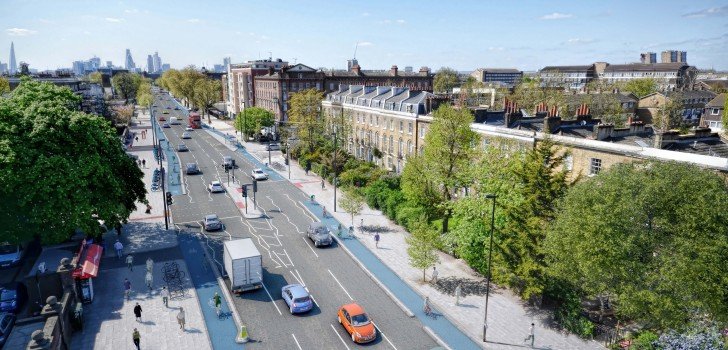London Mayor Boris Johnson announced two huge new bicycle paths that will interweave the city and allow swift, harmless cycling that will alleviate pollution and ease traffic for everyone, including non-cyclists.
The mayor’s achievement in pushing ahead with his intention to construct cycle highways right through the center is nothing short of a small miracle given the city’s size and dense population.
Speaking at the inauguration of the construction in March, Boris Johnson said that the highways will be completed after May of 2016, but the idea stretches beyond just making the ride smooth for cyclists. He said, “Getting more people on their bikes will reduce pressure on the road, bus and rail networks, cut pollution and improve life for everyone, whether or not they cycle themselves.”
The 21 mile “Cross-rail for the Bike” will be completely separated from vehicle traffic: 3 miles traveling north to south (from King’s Cross to Elephant and Castle) and 18 miles running east to west (from Barking to Acton). After completion next year, the highway will be the longest bike path in Europe.
However, Transport for London’s Superhighways has its detractors too. A threat by the Licensed Taxi Drivers Association (LTDA) to proceed to court was withdrawn after it became evident that a legal appraisal of the path would only delay rather than put a stop to the establishment of the new routes.
Through an anonymous briefing (which it later acknowledged), Property company Canary Wharf Group had described the proposed route as being “extremely damaging for London.” Their objections hinged on worries over traffic jams, restricting delivery vehicle entry, overcrowding, and negatively affecting commerce in general.
According to Andrew Gilligan, London’s cycling commissioner, some of London’s municipal sections have been vicious challengers, only caving under enormous pressure and, in one instance, threats to snatch control of its infrastructure.
While Johnson has been a significant booster of cycling in the city, investing £900 million ($1.4 billion) in the development, the original initiative has been long overdue. Ken Livingstone, his predecessor, who became London Mayor in 2000, was exceptionally active in pursuing the cycling program and in 2008 proclaimed £400 million ($624 million) in project plans. Even before Livingstone, there was a long and sustained movement to enhance the profile and the prospect for cycling in London.
Stay Connected